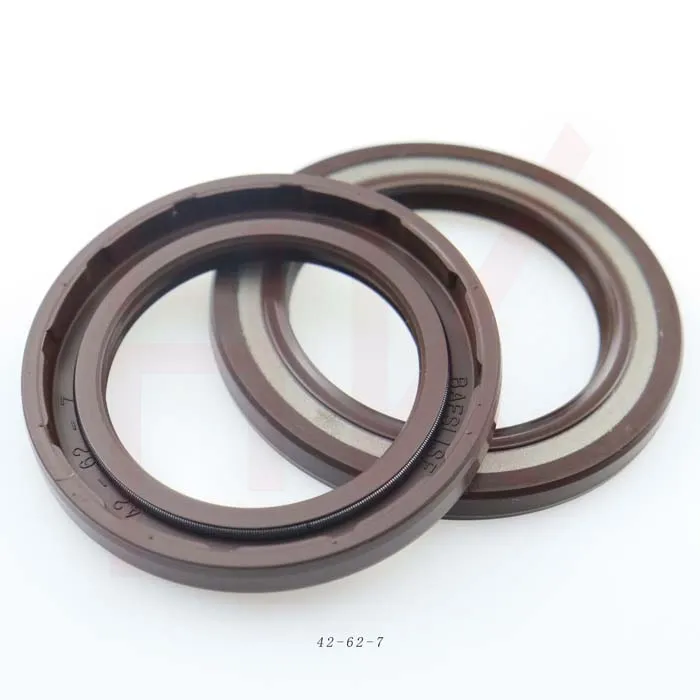Nov . 12, 2024 10:13 Back to list
high temperature oil seal
High Temperature Oil Seals Ensuring Reliability in Extreme Conditions
In various industrial applications, the integrity of machinery is paramount for efficiency and longevity. Amongst the many components that contribute to the seamless operation of machines, oil seals play a critical role, especially those designed for high-temperature environments. High temperature oil seals are specially engineered components that prevent fluid leakage, protect against contaminants, and provide an effective sealing solution in conditions where traditional seals may fail.
Understanding Oil Seals
An oil seal, also colloquially known as a lip seal, is a mechanical component that functions primarily to retain lubrication while excluding dirt, dust, and moisture. These seals are typically made from elastomers, which are flexible materials that can maintain a tight seal even with varying temperatures and pressure changes. However, when the operating temperature rises beyond the normal range, specific materials and design features become essential to ensure the oil seal's functionality and durability.
The Importance of High-Temperature Capabilities
High temperature oil seals are specifically designed to withstand elevated temperatures, commonly ranging from 120°C to 300°C (248°F to 572°F) or higher, depending on the application. Such seals are integral in environments like automotive engines, heavy industrial machinery, and aerospace components where high temperatures and pressure are prevalent.
For instance, in an automotive engine, the lubrication system must function effectively under high thermal conditions to maintain performance. High temperature oil seals are employed to prevent oil leakage, which could lead to significant engine damage and operational failures. Without reliable sealing, not only could the lubrication break down and fail to perform its function, but overheating could cause catastrophic damage.
Material Selection
The effectiveness of high temperature oil seals lies in their material composition. Typical materials include fluorocarbon (Viton), silicone rubber, and polyacrylate, which possess excellent thermal stability, chemical resistance, and flexibility. Fluorocarbon, for instance, can withstand extreme temperatures and has a high resistance to oil degradation, making it perfect for high-stress applications.
high temperature oil seal

In addition to temperature considerations, the chosen material must also accommodate the specific lubricant being used, as different oils can have varying effects on seal performance. Engineers often undertake extensive testing to ensure that the selected materials can maintain their integrity across their operational lifespan, minimizing failures due to heat exposure.
Design Features
High temperature oil seals also feature design innovations that enhance their performance. For example, multi-lip designs can provide additional protection against high-speed centrifugal forces and contamination ingress. Additionally, certain seals are reinforced with metal jackets or used in conjunction with springs that maintain lip contact with the shaft or housing, further improving their sealing capabilities under thermal stress.
Moreover, the installation process is critical. Proper installation ensures that the seal maintains its shape and functionality under high-temperature conditions, which can be a challenge, especially in rotating machinery where vibration and misalignment may occur.
Applications of High Temperature Oil Seals
High temperature oil seals are used across various industries, including automotive, aerospace, and energy sectors. In automotive applications, they are found in engines, transmissions, and differential cases. In aerospace, they protect fuel systems and hydraulic actuators operating in extreme conditions. The energy sector utilizes these seals in turbines and drilling equipment, where high temperatures and harsh environments are standard.
Conclusion
In conclusion, high temperature oil seals are a fundamental component in ensuring the reliability and efficiency of machinery operating in extreme conditions. Their specialized materials and designs protect against leakage and contamination while maintaining performance under high thermal stress. As industries continue to evolve and machinery demands increase, the importance of high temperature oil seals will remain significant, highlighting the need for ongoing innovation and improvement in sealing technology. By investing in high-quality seals, industries can avert costly downtimes, ensure operational reliability, and maintain the performance of their equipment.
-
TCN Oil Seal Metal Ring Reinforcement for Heavy Machinery
NewsJul.25,2025
-
Rotary Lip Seal Spring-Loaded Design for High-Speed Applications
NewsJul.25,2025
-
Hydraulic Cylinder Seals Polyurethane Material for High-Impact Jobs
NewsJul.25,2025
-
High Pressure Oil Seal Polyurethane Coating Wear Resistance
NewsJul.25,2025
-
Dust Proof Seal Double Lip Design for Construction Equipment
NewsJul.25,2025
-
Hub Seal Polyurethane Wear Resistance in Agricultural Vehicles
NewsJul.25,2025
-
The Trans-formative Journey of Wheel Hub Oil Seals
NewsJun.06,2025
Products categories
















